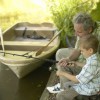 Deployment occurs in almost every branch of the military, and the experience differs for each family and each family member. To reflect the diversity of experiences, military professionals have proposed various models of the deployment cycle to assist families in the transition. There are at least five phases that are common across models: pre-deployment, deployment, sustainment, preparation (also known as redeployment), and reunification (or home-coming). Recognizing that each family is unique, this deployment cycle is intended not as a rule-book but as a helpful guide to families as they experience deployment of a parent. This 4-page fact sheet was written by Elizabeth Thomas and Larry F. Forthun, and published by the UF Department of Family Youth and Community Sciences, March 2013.
Deployment occurs in almost every branch of the military, and the experience differs for each family and each family member. To reflect the diversity of experiences, military professionals have proposed various models of the deployment cycle to assist families in the transition. There are at least five phases that are common across models: pre-deployment, deployment, sustainment, preparation (also known as redeployment), and reunification (or home-coming). Recognizing that each family is unique, this deployment cycle is intended not as a rule-book but as a helpful guide to families as they experience deployment of a parent. This 4-page fact sheet was written by Elizabeth Thomas and Larry F. Forthun, and published by the UF Department of Family Youth and Community Sciences, March 2013.
http://edis.ifas.ufl.edu/fy1368
Tag: Elizabeth Thomas
Kinship Caregivers: Communicating with Children about a Parent’s Deployment (FCS2329/FY1367)
 The deployment of a military parent is undoubtedly a difficult time for children. This is especially true if the military child is being cared for by a relative, or kinship parent such as a grandparent, aunt, uncle, or older sibling. The child may have to experience a kind of personal deployment from their own home. To help children cope with these changes, it is important for the kinship parent to effectively communicate with the child about the deployment and the deployed parent. This will safeguard against emotional and behavioral problems and can lead to improvements in the child’s overall sense of well-being. This 3-page fact sheet was written by Elizabeth Thomas and Larry F. Forthun, and published by the UF Department of Family Youth and Community Sciences, March 2013.
The deployment of a military parent is undoubtedly a difficult time for children. This is especially true if the military child is being cared for by a relative, or kinship parent such as a grandparent, aunt, uncle, or older sibling. The child may have to experience a kind of personal deployment from their own home. To help children cope with these changes, it is important for the kinship parent to effectively communicate with the child about the deployment and the deployed parent. This will safeguard against emotional and behavioral problems and can lead to improvements in the child’s overall sense of well-being. This 3-page fact sheet was written by Elizabeth Thomas and Larry F. Forthun, and published by the UF Department of Family Youth and Community Sciences, March 2013.
http://edis.ifas.ufl.edu/fy1367